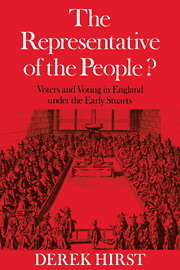Book contents
4 - The support of the House of Commons
Published online by Cambridge University Press: 15 December 2009
Summary
The fear of influence
While it was probably the case that the majority of early 17th-century adult males were not particularly concerned with the parliamentary franchise, a belief that more people should be involved in the electoral process was widespread by 1640–1–and this in a period not noted for its devotion to abstract canons of social justice. General statements that a wide franchise was, or should be, the norm were being made in the country at large, sometimes coupled with the justificatory assumption that this was the legal orthodoxy. Yet as the debates at Putney in 1647 showed, the logical conclusion of the general principle was not one that could command much acceptance, even amongst ostensible radicals. The House of Commons, the guardian of that area of the law which included the franchise, might appear then to have been acting in a puzzling fashion if its actions had allowed such an orthodoxy to form, when popular pressure on the matter was of dubious coherence and reality, and when the social ramifications of an ideological proposition that more people should vote could excite horror in a variety of breasts.
At the end of Elizabeth's reign, Sir Edward Coke reported that the judges in The Case of Corporations had argued that corporation franchises ‘were good and well warranted by their charters, and by the law also … and God forbid that they should be now innovated or altered, for many and great inconveniences will thereupon arise’.
- Type
- Chapter
- Information
- The Representative of the People?Voters and Voting in England under the Early Stuarts, pp. 65 - 89Publisher: Cambridge University PressPrint publication year: 1975



